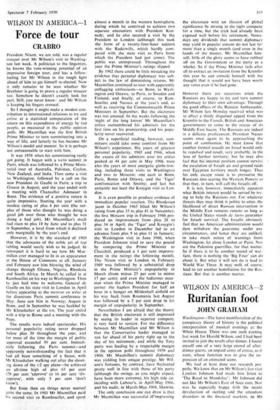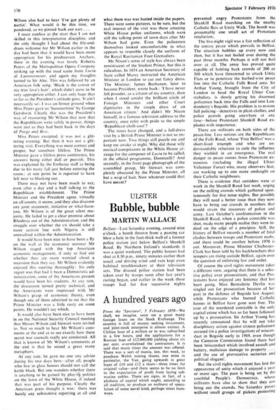WILSON IN AMERICA-2
Ruritanian foot
JOHN GRAHAM
Washington—The latest manifestation of the conspiracy theory of history is the political interpretation of musical evenings at the White House. There was one such evening last week for Harold Wilson, and I had been invited to join the revels after dinner. I found myself one of a very large crowd of after- dinner guests, an unpaid army of extras, as it were, whose function was to give the im pression of an animated scene.
We had at least done our research pro perly. We knew that on Mr Wilson's last visit Lyndon Johnson had made him listen to 'The Road to Mandalay': Mr Johnson did not like Mr Wilson's East of Suez cuts. Nor was he especially happy with the recent devaluation of sterling and the attendant disorders in the financial markets, so Mr
Wilson also had to hear 'I've got plenty of nuttin'. What would it be this time, we pondered, as we pinned back our ears ...
I must confess at the start that I am not skilled in this interpretative discipline, and the only thought I had about the fife-and- drum welcome for Mr Wilson earlier in the day had been that it would have been more
appropriate for his predecessor. Anyhow, there in the evening was lovely Roberta Peters of the Metropolitan Opera Company striking up with the mad scene from Lucia di Lammermoor, and again my thoughts
turned to Sir Alec. This was followed by an American folk song, 'Black is the colour of my true love's hair', which didn't seem to be very appropriate either. I can only hope that as far as the President's attitude goes, 'It ain't necessarily so'. I was on firmer ground when Miss Peters gave us 'Summertime' by George Gershwin. Clearly this was the President's
way of reassuring Mr Wilson that now that the Republicans were safely in power, things were just as they had been back in the days of Porgy and Bess.
Miss Peters excepted, it was not a glit- tering evening. But then it was not a glit- tering visit. Everything was most correct and proper, but somehow lifeless. The Prime Minister gave a lifeless press conference, his answers being either dull or peevish. This was explained by the Embassy staff as being due to his nasty fall just before entering the room : at one point he is reported to have felt near to blacking out.
There may not have been much to say, even after a day and a half talking to the Republican establishment. The Prime Minister and the President agree, virtually on all counts, it seems, and they also disavow any joint statement, initiative or what-have- you. Mr Wilson is of the great silent ma- jority. He failed to get a clear promise about Rhodesia out of the Administration, and the struggle over whether the us should take a more activist line with Nigeria is still unresolved within the Administration.
It would have been nice to have been a fly on the wall at the economic seminar Mr Wilson staged with the top American economic management, if only to find out whether they are more worried about a recession than they say. Mr Wilson evidently enjoyed this meeting thoroughly : his only regret was that had it been a Democratic ad- ministration, some of the Americans present would have been his students. At any rate, the discussion turned pretty technical, and the Americans were impressed with Mr Wilson's grasp of economic theory, even though one of them admitted to me that the Prime Minister was a little rusty on some points. He wouldn't say which.
It would also have been nice to have been in on the National Security Council meeting that Messrs Wilson and Stewart were invited to. Not so much to hear Mr Wilson's com- ments at the end as to see exactly how these secret war councils really are conducted. All that is known of Mr Wilson's comments at the end is that he mixed a great many metaphors.
At any rate, he gave no one any advice during his two days here—after all, people who live in glass houses should not call the kettle black. But one wonders whether there is anything to be gained by playing politics on the lawn of the White House, if indeed that was part of his purpose. Clearly the American press thought it was: there was barely any substantive reporting at all and what there was was buried inside the papers. There were some pictures, to be sure, but the real interest of the visit was those amazing White House police uniforms, which were still the talking point of town days after Mr Wilson had gone. Even the policemen themselves looked uncomfortable in what appears to resemble closely the uniform of the Royal Ruritanian Foot Grenadiers.
Mr Nixon's sense of style has always been reminiscent of the Student Prince, but this is ridiculous. In 1854 an American Secretary of State called Marcy instructed the American Minister in London to cut out fancy dress. The Minister, James Buchanan, later to become President, wrote back : 'I have never felt prouder, as a citizen of my country, than when I stood amidst the brilliant circle of Foreign Ministers and other Court dignitaries in the simple dress of an American citizen.' And didn't Mr Nixon himself, in a famous television address to the country, once refer with pride to the simple 'Republican cloth coat'?
The times have changed, and a full-dress visit by a British Prime Minister is not so im- portant now. Two things still puzzle me and keep me awake at night. Why did those wily
musical conspirators in the White House ar- range for the composer of Lucia to be called, in the official programme, Donnizelli? And
secondly, in the front page photograph of the assembled group, Mr Stewart was com- pletely obscured by the Prime Minister, all but a wisp of hair. Now whatever could that have meant?



































 Previous page
Previous page